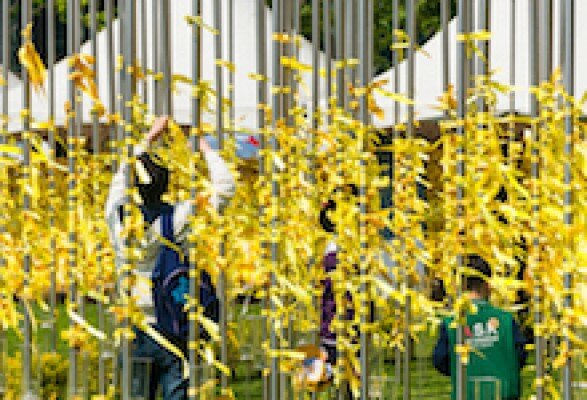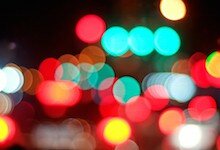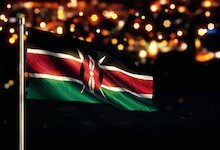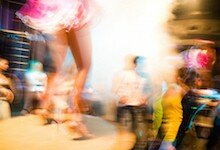Poet be gone

Renshi is an unfamiliar genre in Korea. When I first encountered our renshi project, I thought its rules might be too cumbersome like the rules of poetry enjoyed by the upper class men during the Chosun era, which involved several men taking turns to compose a line. I became anxious that my ability to breathe and float with the rhythm of the poem would be oppressed. As a Korean poet I have had previous traumas, which makes me overly sensitive to the slightest hint of constraint dictated from the outside. Our first theme was “sea.”
Strangely, the same scene kept appearing in my mind, the scene of young students boarding a ferry. The scene appears along with the kind of communal excitement that takes hold of me when I am about to begin an orientation with my new students; the sweet and sickly scents that the young bodies exude from the excitement. The overwhelming scents move in from somewhere and the scene emerges. The poet is a citizen of afterimages. The place where the end begins again is the poet’s space. At such a juncture, a soul remains forever in the moment of fleetingness after everyone has left the scene, and the poet even sets up home for the soul. The point where the end begins again, there is no “I” of the afterimage. The “I” exists as a lump, a bundle of experiences. One of the characteristics of afterimages is that they revisit the fleeting moment endlessly. They return. The verb that permits and drags along the motion of perception triggered at the moment of each return is all that the poet, the citizen of afterimages, possesses. The world of images keeps coming back even if all of you have forgotten or departed. The poet relives the scene endlessly as if digging a grave. The poet perpetually attains presentification, allowing the day, the moment to soar from the grave of language. The poet believes everything must be symbolized. As I began working on renshi, I reminded myself of the small fringes of my afterimages. But as soon as I submitted my first poem, it felt as if the energy of my poem extended to the poets of China and Japan was severed because of my dark poem about the children boarding a ferry. But Yasuhiro, Shuntaro, and Mindy understood right away and let me know through e-mails that they were well aware of the Korean ferry tragedy.
I continued to recall the particles of afterimages. I thought about the motion of particles that moved from one matter to another, that extended from one person to another. I thought about the fluidity of the particles that had no borders. I thought about the fog that moved in outside the window at night while I stayed restless after turning off the live coverage of the capsizing of the ferry, which unfolded like a mirror. I thought about the particles that embraced my entire room like fog. I thought about the explosion of every single particle. But the particles whirled and sank endlessly. Like a mirror turned on all the time, the live TV coverage of the sinking was shown on the walls of my room. Whenever I tried to set the scene of the sinking ferry onto the world of language, the countless streams of anger, shame, and sorrow flowed backward, engulfing me. As the renshi progressed, the sea or sea of letters that extended beyond the width of its skirt into the five seas and six continents capsized once it entered Korea’s sea. Yasuhiro suggested, “Generally speaking, it is not recommended to repeat the same topic or image again and again in renshi.” This made me think about what I experienced after the tragedy, that the sea for a Korean poet was no longer a metaphor. Korean poets have lost the storehouse of metaphors called “sea.” Language solidified and the mystery of poetry hardened. Language scooped up its own shadow from its interior. I could no longer write poetry.
The sea is no longer the locus of metaphors.
XX said metaphorically in the poem: Going under water.
The vast world is tied with ribbons of metaphors.
I must ask for forgiveness.
The poet is now robbed of seasons.
Summer doesn’t come after spring. A warm winter follows.
Flowers bloom all at once then die.
The flowers bud like the fists XX clenched in the poem.
I must ask for forgiveness for speaking metaphorically.
XX is now robbed of God.
It is now difficult to pray to God.
The above is not (part of) a poem. The line breaks don't make it a poem. It is a description or an essay. It is like a mask worn on a face dripping with sweat and tears. From that day of the tragedy, it was pitch dark even at daylight. Darkness fell on me. Pencils returned to their graphite state, ink spilled onto the ground. It was impossible to write poetry in the room of pitch-dark shame. Like language that has become useless to parents who have lost their children, poetry has also become useless. Isn’t there a saying that poetry creates a world of usefulness with useless language? However, poetry has extinguished the fire inside the poet. The foundation, “us,” is destroyed. In my destroyed state, I could not endure the shame of having taken part in the destruction. The poet was enwrapped in the manifestation of the parents who devour their own children in myths. I became locked up in the prison of shame. How is it that my country keeps stirring up the anguish and tragedy of the survivors day after day, year after year? The column I was writing for a literary journal came to a halt; my writing lost its voice. But I kept going to work in City of Ansan without fail. The citizens of Ansan wore black for an entire year, so I, too, commuted to and from work in black. Last spring, flowers were in bloom all at once as if caught in a shameful act, but no one talked about it. The petals blew in the wind along the streets of the city, its soul extinguished. I asked my students to write essays in place of an exam. Not one of them mentioned the sea in which the ferry capsized. Instead, they went to volunteer at the memorial site for those who perished in the sea. One student asked me: Are you able to write poetry at such a time as this? No, I couldn’t at all. The “I,” the poetic subject constructed by language, which propels the world of language and drives the present names to their death every second, was released. Only thing that was clear to me was the dichotomous world made up of intense pain on one end and language on the other. Language and pain pushed each other out. However, I still could not write.
As the train gets near its destination, an announcement is made:
“If you are taking a shuttle bus to the memorial site, please get off at the next station.”
“If you are walking, please get off at the station after the next one.”
For heaven’s sake, what kind of country has an announcement on the train about a funeral?
At the end of a long line, I lower my head and offer a bouquet of chrysanthemums.
As the line becomes shorter the fresh, clear, unblemished,
and lively faces of the children who died weigh heavily on my mind.
The mourners are silent. They have come from afar.
No one complains despite the long wait.
They all cry after paying their last respects, offering chrysanthemums.
They are given several sheets of tissue as they leave.
Outside each mourner writes a letter.
To the place of endless darkness.
To the place of endless coldness.
To the place of endless bleakness.
They write, Hope to meet you again in another country.
Rest in peace in another country.
How easy it is to kill God,
XX thinks in the morning of Easter.
Everyone in this city goes about in black.
Nobody smiles.
The spring blossoms are noticeably vulgar.
XX despises the flowers in full bloom.
XX despises the pink blossoms.
The above is also not (part of) a poem. It is a diary. A surface. A record of facts with feelings attached to them. It is denotative. The inexpressible cannot be activated in the denotative world. Language that keeps running with a tail of nostalgia attached to its end has dried up, leaving behind an information-ridden language. In such language, there is no Lao Tzu’s “valley”, “darkness”, or “woman” that are like the void, uterus, or hole where poetry can be alive again. In such language, there is no space for things and essence that shed their attire of being, no space for them to be nameless and live together, without borders, in disappearance; there is no space for poetry to live. One aspect of poetry is the poet’s absence, the poet’s symbolic death; poetry erodes the center through the poet’s bareness and scarcity. By residing in the absence within her, by pitting her own death against poetry’s death, she can cut across the center. Poetry, as it gasps, barely breathing, draws up absence, death from the world of overflowing practicality. The gaping hole in the middle of poetry, the placeless place, is the space of poetry. Poetry is filled with words, yet it embodies absence like the wheel’s axis. Poetry is another reality captured through absence. The poet announces the reality’s fast-approaching death with silence-filled words, and by doing so, meets her own death inside poetry. The poet is a being that lives because of death. A being that is neither dead nor alive. That is why those above sentences with line breaks are not (part of) a poem. In those shifting lines, the poet’s presence is excessive. There is too much of the “I.” I say only the words that I can. Poetry is a space where the inexpressible is expressed, but I fill it up by saying only the things that I can. The “I” dies in order to become the “I” in poetry, but in those sentences, I do not die. Since I have failed to die (noun), I am unable to express the world of experience with verbs only. Therefore, those lines are not a poem.
After the Sewol tragedy, I was unable to discard myself. The poet was not able to become the other. Can anyone imagine the hours the parents who have lost their children are left with? I thought about the despair of the parents who are not even able to safeguard their mourning and sorrow. I watched them endure the unavoidable pain of seeing their grief being subjected to generalization. The poet’s space that should be full of absence and emptiness filled up with dark bile instead. After a whole year, not a thing has been made clear. How is this possible? They make our blood boil. Not a single individual has admitted responsibility. Which part of the leviathan, fattened by the web of neo-liberalism made of transparent reinforced steel, am I clinging to? Have I lived all these years unaware of the fact that I am caught in the web of perpetration? The questions and answers were exactly the same, adding to my despair. The poet’s “valley,” “darkness,” “woman” were locked up, unable to conjure up even the poet’s ghost. The poet was totally incapable of writing. I could not fall into the hole that floats around the realm of poetry inside me. I could not hear what my hole was saying. I tried hard to avoid the fact that my hole was connected to other holes like the sewers beneath the manhole cover. I was unable to relinquish myself. Like someone who suffers from pain might feel that she is an outcast, I also felt like an outcast in the world of poetry. I kept rejecting myself: Poet be gone. My valley was dead, turned into blackness. The poet’s language is neither personal nor communal; it is suspended in between, on the cliffs of the boundaries. Then the words of poetry have no choice but to slip out from the gap between the inside and the outside. The poet is always under the dire predicament of having her life overlapped with the life outside her. But after the tragedy, I was too “alive” inside. I was filled with anger and sorrow instead of emptiness that is needed for poetry to emerge. I could not empty myself. I could not distance myself as the other. I could not activate my non-being. So I was unable to call out the name of the secret. I was unable to call out the experiences that are entangled with the secret’s name.
As soon as the theme “sea” came to an end, “rice” and “sun” followed. Shuntaro began the theme of “sun” with the image of the flag of Japan and declared: “It looks so innocent that it might have been conceived of by a child . . . I will never ever wave the flag.” These lines contained a kind of courage, which I could not express in words. I felt afraid that if I made a comment about it, I would only weaken the strength of the courage present in Shuntaro’s words. The trilingual renshi project allowed me to knock on the world of afterimages again. I was still afraid of opening the door, but once I accepted the invitation to take part in the project, my submerged face began to open the door; I started to feel as if I might have something to say. At the exhibition called Children’s Room, held at the corner of a small shopping mall near the houses where the children once lived, I peered into the empty rooms of the children who perished in the sea. Their school uniforms, blankets and pillows, baseball gloves, bicycles, desks, reference books, and hangers. The pictures of their idols. Their future at a standstill. But most of all, the children’s faces left in the middle of the empty playground after they had drifted away. I stayed silent and listened to the voices of the afterimages. The world left bare by all the emptiness was inside and outside me. I felt that the outside world of experience wanted to be embraced once again. That empty world where you and I are not divided, the calm, silent world, like the eye of a storm. I went out to that space and sensed the endless opening of the “valley,” “darkness,” “woman,” and the rhythm of the breathing of a certain collective existence, collective emotion. The children’s silence is in that space. The children’s cries are the poet’s death, their cries reborn through death into the kingdom of absence. The sound of the silence can only be detected when the “I,” the poetic subject, dies. The cries of the silence prevent “I” who is filled with the closed “I” from encountering the name “I.” The children can never be destroyed. Cherishing the children who had barely lived. The future of cherishing. The children are already born inside the infinite space the poet must enter. They appear in the infinite form of the smallest, the weakest, the banished.
This essay appears in the book, Trilingual Renshi, available from Vagabond Press.








